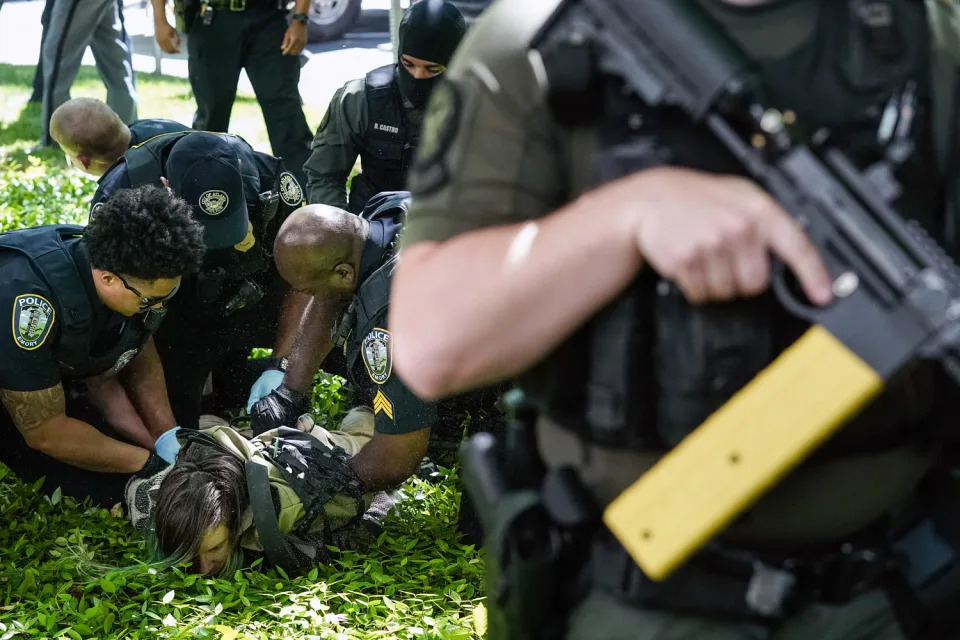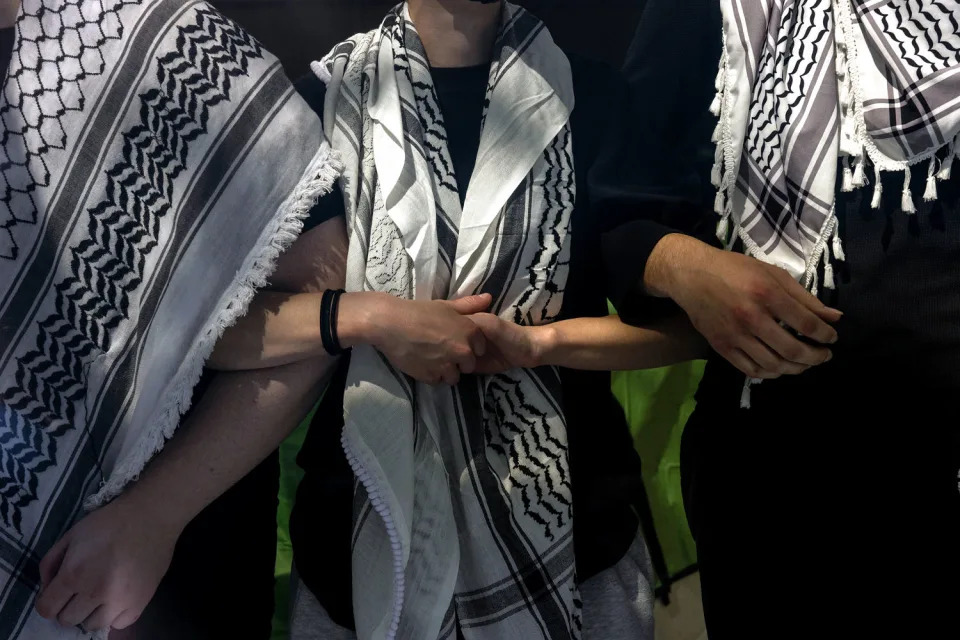eyes whole thing rather doubtful - something to show world how there are people in US who oppose genocide in Gaza rather than THERE WERE PEOPLE IN USA WHO KNEW ALL ABOUT COMING GENOCIDE IN GAZA AND WERE OFTEN RECRUITED BY CIA/FBI to misrepresent interests of US Government in coming genocide of Palestinians in Gaza. For licking shoes of Israel, your president(known also as student debt forgiveness president) will either pardon you or reasonably reduced your sentences so you will be still capable to find temporary jobs till completely wasted as homeless. I estimate protests across US campuses were at large controlled by CIA/FBI.
STARVATION AND POTENTIAL ICC WARRANTS ON GAZA: WHAT DOES INTERNATIONAL LAW SAY?
Arrest warrants for Israeli leaders are reportedly – according to sources in The Hague and Israel – being prepared by the International Criminal Court (ICC), possibly related to allegations of starvation. Anne van Mourik and Lucy J. Gaynor unpack the weaponization and criminalisation of starvation and describe how prosecuting the crime of starvation in Gaza would bring the ICC into uncharted territory of international criminal law.
Over 2300 protesters ARRESTED at US campuses
University leaders face calls for accountability after crackdowns on pro-Palestinian encampments
Joe Kottke
Updated Mon, May 6, 2024 at 3:09 AM GMT+2·6 min read
- Pro-Palestinian activists have launched encampments at over 70 campuses to protest Israel’s military assault on Gaza and demand divestment from companies doing business with Israel.
- Nationwide movement has led to clashes with police, over 2,300 protesters arrested, and frustration among school communities with administrators' handling of campus protests.
- University administrators are facing pushback and criticism for using police to crack down on encampments and protests, with faculty and students demanding accountability.
Pro-Palestinian activists have launched encampments at more than 70 campuses to bring attention to Israel’s monthslong military assault on the Gaza Strip and to demand that schools divest from companies doing business with the country. The nationwide movement has led to clashes with police and more than 2,300 protesters being arrested in the past few weeks, according to an NBC News tally.
Now, as many students face legal and disciplinary action and universities are reassessing commencement plans, school communities are expressing frustration with administrators’ management of campus protests.
On Wednesday, a group of pro-Palestinian protesters formed an encampment at Fordham University’s Lincoln Center campus in New York City. The school called on the New York Police Department to assist, and police arrested 15 protesters.
In a statement addressed to the school community released later that evening, Fordham President Tania Tetlow characterized the encampment inside the Leon Lowenstein academic building and the protest directly outside as “different” from previously held events on the college campus, and added that “hundreds of protesters came from elsewhere.”
“We draw the line at intrusions into a classroom building, especially by people who are not members of our community. (There is a difference between free speech and people barging into your home to shout.),” she wrote.
In a letter shared exclusively with NBC News, two Fordham faculty members presented an analysis of what they consider to be Tetlow’s “inaccurate and misleading statements” to the Fordham community.
Assistant professor Leo Guardado and associate professor Carey Kasten provided an in-depth timeline of the May 1 events to the Fordham Faculty Senate on Friday. They also presented a compilation of photos and videos taken by faculty members who elected to serve as observers of the encampment.
The evidence was used to dispute almost 10 claims Tetlow made in her letter. NBC News has not independently verified either side’s claims.
One of those contentions includes an exaggeration of the size of the indoor encampment. The professors claim that, based on eyewitness accounts and video evidence, about 20 people were a part of the encampment, when Tetlow said “several dozen people pushed inside the lobby.”
Guardado and Kasten also claimed the language in Tetlow’s letter suggested that the majority of individuals involved in the encampment and protest were not affiliated with Fordham.
“The arrested protesters were students and alums. Many of the people outside were students, faculty and alums,” Kasten said. “This is our community.”
Tetlow said the university remains committed to allowing peaceful protests, but the professors’ letter to the Fordham Faculty Senate argued that the encampment was nonviolent and that “all participants remained peaceful in their protest throughout the day.”
Danie Taylor, a professor in the Fordham theater program, said he was disheartened by the university’s failure to “uphold its own mission statement,” which includes the “promotion of justice” and the “protection of human rights.”
“We must hold our institution accountable to its stated values of social responsibility and ethical conduct,” he said.
Fordham University did not immediately respond to a request for comment Saturday.
School administrators face pushback
University administrators are experiencing pushback and fielding criticism for their decisions to use police to crack down on encampments and protests.
Last week, after a pro-Palestinian encampment began on Emory University’s campus, police arrested 28 individuals — 20 of whom were Emory community members.
After the incident, the Faculty Senate of the Emory College of Arts and Sciences, one of the university’s nine schools, passed a vote of no confidence in President Gregory Fenves, with 75% of members voting in favor of its passage, according to Laura Diamond, assistant vice president of university communications.
In response to the vote, the university said in a statement: “While we take any concerns expressed by members of our community seriously, there are a wide range of perspectives being shared.”
On Friday, the NYPD arrested 43 individuals while the New School’s encampment was cleared. Later that afternoon, more than 200 faculty and staff members from all five colleges within the university convened an emergency meeting.
The meeting, hosted by the New School chapter of the American Association of University Professors, held three votes, including a vote of no confidence in President Donna Shalala and the board of trustees. More than 90% of members voted in favor.
A vast majority of the group also voted for all charges and disciplinary actions against students to be dropped.
“The results of this emergency meeting are simply a first step, initiated by workers at The New School profoundly angered and distressed by the administration’s treatment of our students,” the group said in a statement on Friday. “President Donna Shalala’s decision to invite police onto campus under the flimsiest of premises, to arrest students involved in nonviolent protest, at a time when no faculty support was on hand, is intolerable.”
At University of Texas at Austin, where police arrested 57 pro-Palestinian protesters on April 24, more than 600 members of the university’s teaching staff signed an open letter claiming no confidence in President Jay Hartzell.
“The President has shown himself to be unresponsive to urgent faculty, staff, and student concerns. He has violated our trust. The University is no longer a safe and welcoming place for the diverse community of students and scholars who until now have called this campus home,” the letter stated.
It was sent to Hartzell on April 29, after some faculty members declined to hold class or grade assignments earlier in the week to protest the university’s response to the encampment.
The faculty members of the Columbia University history department condemned the use of police force against students and referred to the similar anti-war protests that took place on campus in 1968.
“Since the last time the police were called on this campus in large numbers, in 1968, Columbia has worked hard to restore community, build shared governance, deal peacefully with protest, and maintain a culture of respectful debate. We must hold on to this legacy,” the department said in a statement.
Students are also taking action against university administration after the crackdown on pro-Palestinian activism.
At the University of Southern California, the undergraduate student government sent a letter to President Carol Folt expressing disappointment in the administration’s use of force, after the Los Angeles Police Department arrested nearly 100 people on April 24.
“The escalation of police violence on our campus is an experience we never imagined — much less one being fronted by our university,” the letter, released on April 28, stated.
The USC students called for no further “retaliatory action” against them for participating in peaceful assemblies.
“We expect the university’s disproportionate response to the demonstration on April 24th to never recur on this campus,” the letter continued. “To the administration, we expect better.”
At Columbia University, students filed a complaint with the U.S. Department of Education’s Office for Civil Rights to investigate discrimination against Palestinian students and their allies.
In addition to faculty and student efforts to demand accountability from administrators, organizations such as Palestine Legal are stepping in.
In Florida, a coalition of seven organizations — including the state’s chapters of the ACLU and NAACP — delivered a letter to Florida college and university presidents on Friday to express concern over “unnecessary use of force by law enforcement and encroachments on First Amendment rights,” citing university responses to the peaceful protests as “troubling and dangerous.”
This article was originally published on NBCNews.com





No comments:
Post a Comment